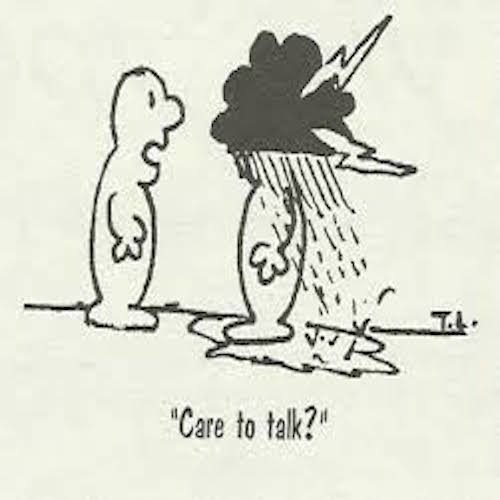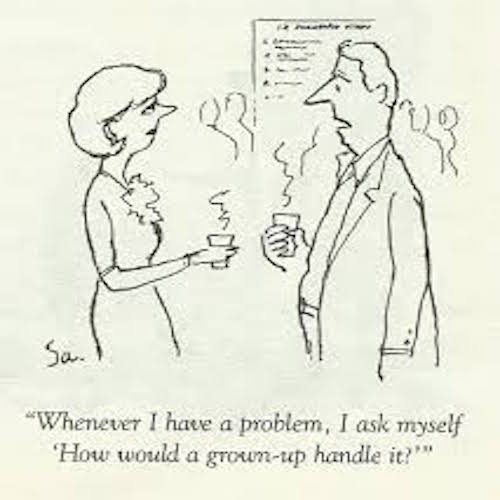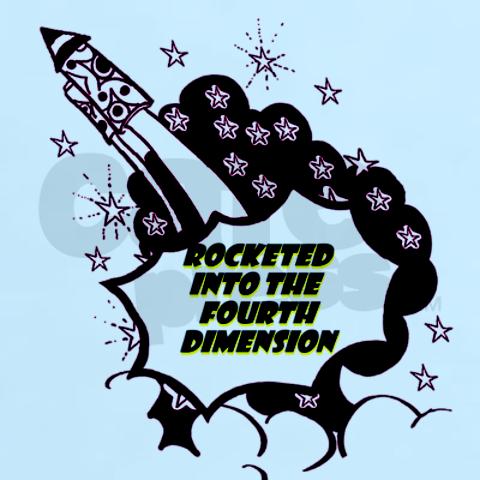
When I was four years sober, I got very close to self-destruction.
My life was in shambles, I hated living, I hated people, I hated AA, and most of all, I hated — even despised — myself. I didn’t start the journey back to mental health and emotional stability till I was told by a wonderful sponsor the following bad news:
My life was just as unmanageable as it ever was, that I was closer than I knew to a drink, and that even though sober for a few years, Step One applied to me as much as ever
“You’re wrong,” I told him. “All the things that made my life unmanageable aren’t true anymore. I’m not getting arrested, I’m paying my bills, I don’t owe anyone an apology or an amends. I’m better now.”
The bastard laughed at me.
Today I’d like to share what he said next.
That message started me on the road to genuine recovery and it is my hope it will do the same for many of you.
Step One (for the Clean and Sober)
From the beginning of “The Doctor’s Opinion” to the end of “More About Alcoholism,” the Big Book discusses the overt reality of Step 1, which states: “We admitted we were powerless over alcohol.” Until about page 23 in the Big Book we learn and (hopefully) internalize how we are powerless physically. From 23- 43 we read about how we’ve been powerless mentally. So far, so good. Almost all of us can deal with this part; it makes a certain kind of sense and is easily observable by examining our own histories, by looking at our own experiences.
But what about the third part of our disease that’s mentioned in the book: the spiritual malady?
When that sponsor asked me to explain the three-part nature of the disease of addiction (mind, body, and spirit), I could only talk about the “allergy of the body and obsession of the mind.” I could only affirm a truth repeated in AA meetings all over the world: that once I put any mind-controlling substances in my system, it sets off a craving for more.
“Okay, Chris” my sponsor said. “You’re really good at parroting what you hear other people say. Explain the part of your disease that triggers the mental obsession in the first place. Tell me why people who have remained in recovery for 1 year… 2 years… 5 years… 10 years… and in some cases even 20 years or more, go back to drinking and using?”
“Good question,” I muttered, irritated as hell and wondering why my coffee tasted so bitter.
He laughed at me
<< the bastard >>
And started to explain. Here is what he said:
“We know the physical craving does not cause these people to start up again. No matter what you’ve been taking, within three days to six months that substance has been totally processed out of your body.
“We also know that after a period of time in the fellowship, the mental obsession dissipates.
“So why is it that after a long period of time in recovery many people in our fellowship return to drinking and using – EVEN WHEN THEY DON’T WANT TO? What is the third fold of our illness that triggers the mental obsession – even though not drinking?
“The missing piece of Step 1 is referred to in our literature as the spiritual malady.”
For a long time I thought my life was unmanageable because of all the crazy, insane things I did while drinking; car accidents, hurting people when I didn’t mean to, failed relationships, loss of jobs, family dysfunction, jails, asylums, etc. Those details are not the core of my unmanageable life. They are external symptoms.
Of course those things are all clear examples of unmanageability. When I’m working with some new guy who isn’t sure if he’s an alcoholic or not, these are the kinds of things we focus on — lost cars and lost girlfriends and lost wallets… that kind of thing. If you are in your first 180 days, these are probably the only kinds of unmanageability factors you will be able to discover.
That is perfectly okay.
Some newcomers have a hard time with even EXTERNAL unmanageability. For those guys, I offer a list of step one journaling questions. If you scroll down to the bottom of the page, you can find them and use them yourself. Another option is the NA: Step Working Guide. A third is the Step One Worksheet.
But what about the rest of us (who aren’t getting arrested and whatnot); what types of “unmanageability” does the first step address?

For those of us with time in the program, the continuing unmanageability isn’t that outward stuff, it’s the inward unmanageability of our lives – the restlessness, irritability, and discontent most alcoholics suffer through before they picked up their first drink. There are many names for this “inward unmanageability”. Some refer to it as “untreated alcoholism.” Others use the term “bedevilments.” Page 64 simply refers to this “inward unmanageability” as “the spiritual malady.”
Our book promises us that “When the spiritual malady is overcome, we straighten out mentally and physically.” The mental and physical factors of alcoholism are put into remission AFTER the “spiritual malady” is overcome – which means I’m still in danger of drinking until I have a spiritual awakening – whether I think so or not.
Two key points I’d like to focus on:
-
What really is this “spiritual malady” and how, if left untreated, can it drive an alcoholic back to drinking?
-
What is the remedy for it?
Imagine three layers. The first layer is our bodily reaction to alcohol when we ingest it – the physical craving. Under that is the second layer: the insanity of the mind just before the first drink – the mental obsession. Under that is the third layer: the inward condition that triggers the second layer, which in turn triggers the first – the “spiritual malady.”
When working with someone who has time under his belt, I offer a series of journalling questions based on the spiritual malady described in the Big Book (the inward measures of unmanageability as opposed to the outward measures of the same condition):
- being restless, irritable, and discontented (page xxvi),
- having trouble with personal relationships,
- not being able to control our emotional natures,
- being a prey to (or suffering from) misery and depression,
- not being able to make a living (or a happy and successful life),
- having feelings of uselessness,
- being full of fear,
- unhappiness,
- inability to be of real help to other people (page 52),
- being like “the actor who wants to run the whole show” (pages 60-61),
- being “driven by a hundred forms of fear, self-delusion, self-seeking, and self-pity” (page 62),
- self-will run riot (page 62),
- leading a double life (page 73),
- living like a tornado running through the lives of others (page 82), and
- exhibiting selfish and inconsiderate habits.
- These are just a few of the symptoms of the “spiritual malady” that’s described throughout our text.
What is it really? What is the driving force of the symptoms described above?
On page 62 the text explains that “Selfishness-self-centeredness! That, we think, is the root of our troubles.” This “SELFISHNESS-self-centeredness” (or the “ego”, as some people refer to it) drives us to respond to life situations with the above “symptoms” as well as disorders and addictions other than alcoholism.
If this selfishness-self-centeredness continues to manifest in an alcoholic’s life – EVEN IN SOMEONE WHO IS NOT DRINKING AND CONTINUES TO ATTEND MEETINGS – and the ego is not smashed and re-smashed by continuous application of all twelve steps, the sober (or “just not drinking”) alcoholic is sure to drink again eventually… or even worse, continue to live miserably being “undrunk” (better known as a “dry drunk”). This is why we see people with 10 years in AA wind up in mental institutions – AND THEY HAVEN’T HAD A DROP TO DRINK!
You see, if I continue to act out with selfish – self-centered – ego-driven behaviors I will continue to experience the symptoms of the “spiritual malady.” If I continue to experience this inward unmanageability, eventually my mind will seek out the “sense of ease and comfort” it thinks it can receive from taking a drink. Or, my ego can deceive me into thinking I’m doing perfectly fine. (i.e.: Fred’s story in Chapter 3… Fred drank when there wasn’t “a cloud on the horizon”.)
We all know someone who told us and others: ”Well, at least I’m not drinking!” right before experiencing what they later described as a strange mental blank-spot — otherwise known as a “sober blackout.” Before they knew it, they were pounding on the bar, asking themselves “How’d this happen?”
How can you tell if you’re suffering from the “spiritual malady”
Spiritual Malady Self-diagnosis Questionnaire
- What condition is your “inner life” in, currently?
- Are you experiencing the symptoms listed above?
- Has it been a while since you’ve taken another alcoholic through the Steps?
- Has it been a while since you’ve gone through the steps?
- Have you ever taken all of AA’s Twelve Steps?
- Have you done more than one 4th Step inventory?
- Have you completed all your 9th Step amends wherever possible?
- Are you working with the disciplines and practices of steps Ten and
- Eleven (self-examination, meditation and prayer)… consistently… EVERY DAY?
- Above everything, we alcoholics must be rid of this selfishness (“the ego”). We must, or it kills us! God makes that possible. And there often seems no way of entirely getting rid of self (ego) without [God’s] aid. (62)
There is a solution. Almost none of us liked the self-searching, the leveling of our pride, the confession of shortcomings, which the process requires for its successful consummation. But we saw that it really worked in others, and we had come to believe in the hopelessness and futility of life as we had been living it. When, therefore, we were approached by those in whom the problem had been solved, there was nothing left for us but to pick up the simple kit of spiritual tools laid at out feet. We have found much of heaven and we have been rocketed into a fourth dimension of existence of which we had not even dreamed. (25)
This “fourth dimension”, which we find out in the 10th Step is the “world of the Spirit”, takes us beyond the physically, mental, and emotional dimensions of life – and eliminates the selfishness (ego) of the “spiritual malady.” The term “spiritual malady” does not mean that our “spirit” is sick. It simply means we are spiritually blocked off from the Power of God, which enables us to remain sober, happy, joyous, and free.
It’s not my body – my allergic reaction to alcohol – that’s going to take me back to drinking. It’s really not my mind – the mental obsession – that is the underlying root of what will take me back to drinking. It’s the “spiritual malady”, as manifested by my EGO (selfishness-self-centeredness), that can eventually lead me back to drinking or sometimes even suicide.
On pages 14 and 15 Bill W. writes, “For if an alcoholic failed to perfect and enlarge his spiritual life through work and self-sacrifice for others, he could not survive the certain trials and low spots ahead. If he did not work, he would surely drink again, and if he drank, he would surely die. Then faith would be dead indeed. With us it is just like that.”

Thankfully, the “spiritual malady” is no longer a “missing piece” of Step One for me. It is a reality of my powerlessness and unmanageability and enables me to see why I continue to seek a Power Greater than myself. And unless this malady is recognized, and a course of action (the Twelve Steps) is taken to enable God to remove it, the root of our alcoholic illness can lie dormant and burn us when we least expect it.
Journalling prompts; the first step
- What were all of the types and amounts of alcohol and drugs I used, from my first time to the present? What did it cost me or others – purchases, income, fines? Emotional cost?
- When have I experienced the abnormal physical reaction to alcohol? “One drink leads to another.” Suggestion: Describe the last drink or a similar episode in detail.
- When did I recognize that I lost control of my drinking? Examples: I drink to excess. I cannot stop when I want to. Heard in a meeting: “When I drink I break out in a binge.”
- In what ways have I attempted, and have failed, to control my drinking? Did I use alcohol, or did alcohol use me?
- What were the things I did while acting out on my disease that I would never do when focusing on recovery? (ie: destructive behavior, loss of memory and blackouts, being abusive physically or verbally, insane and suicidal behaviors, etc.)
- What would my life be like if I admitted being powerless over alcohol and other dysfunctional behaviors?
- What other aspects of my life am I powerless over?
- In what ways has my disease been active recently? How do I behave compulsively?
- When and how has my mind told me that one drink will not hurt?
- How did jails or institutions take over the management of my life at different times?
- How am I addicted to changing my mood? What was I trying to change? In what ways am I addicted to looking outside of myself for exterior things to change the way I feel?
- Are there situations that I fear will be so painful that I will drink again?
- How is my addictive thinking and behavior manifested in my life today? Be specific.
- What is it like when I am obsessed with someone or something?
- Do I maintain a crisis mentality, reacting to every challenge as a personal insult? How has this affected my life?
- Do I insist on having my own way? Do I consider the needs of others? How has this behavior/attitude affected my relationships?
- What in my life can I truly manage?
- What managed my life when using, and what manages my life in recovery?
Inspired by a talk given by Mike L. of the Carry THIS Message Group in West Orange, NJ titled: The Missing Piece: The Spiritual Malady.
